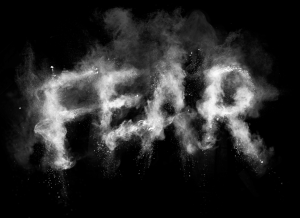deconstructing fear
 Fear can be a life killer. It really can.
Fear can be a life killer. It really can.
I see people struggling with this every day in my therapy practice in the Flatiron District of Manhattan, NYC. And I have no trouble telling my therapy clients that I, too, know what this is like. In fact, it was such experiences in my own life that initially led me to study psychology and then ultimately to become an NY State licensed psychotherapist. Time and time again, so many of us seem to find ourselves succumbing to fear by shrinking from life, postponing action, catastrophizing about the future, avoiding interpersonal intimacy and/or hiding out in our comfort zones.
Is this you as well? Do you identify with any of the following life-inhibiting patterns?
- I feel nervous and uncomfortable in most social situations, unless I numb my feelings with alcohol or other substances.
- I don’t want others to know how bad I truly feel about myself.
- I’m always people-pleasing in order to avoid conflict because I cannot stand when others are upset with me.
- I carry a vague feeling that I’m going to be found out and exposed as a fraud.
- I have intrusive thoughts telling me that I’m unattractive, uninteresting, unlovable and defective—and that I’ll be alone forever.
- I often feel that my career is about to implode; I fear that I will be fired and end up financially destitute.
- When I talk to other people, my first impulse is to conceal (rather than reveal) my authentic thoughts and feelings, for fear of being rejected or judged.
- I’m generally anxious, restless and consumed with worry, and I spend enormous amounts of energy hiding this fact from others.
Suffering from chronic and excessive fear (i.e. anxiety, worry, panic, insecurity, emotional un-safety) is debilitating not only because of the dreadful feelings themselves but because they are inextricably intertwined with habits of thinking and behavior that are highly self-defeating. This is precisely why healthy adulthood requires that we learn (if we did not learn earlier) how to identify and effectively transform fear so that it is a source of growth rather than paralysis.
why do some people experience excessive fear, anxiety & worry?
The seeds for our emotional habits & patterns are planted in childhood. It’s up to each of us to deconstruct, unpack and understand how we developed, and how we continue to perpetuate, our habits/patterns of fear:
- What aspects of my early family dynamics and early childhood set the stage for me to develop habits of fear-based living?
- What patterns of thinking and behavior did I develop in my teens and/or young adulthood, and that I still engage in today, that perpetuate fear, worry and anxiety in my life?
- In what ways do I participate in relationships that are fear-based (i.e. distant, aggressive, unserious, hyper-guarded, controlling, blaming, dishonest, etc.)?
- What patterns of thinking and behavior can I practice in my life today—one day at a time—that can help me heal and grow beyond my habits of fear and to live with more calm, confidence and internal security?
relational cognitive behavioral therapy
To look deeply into these questions is a core dimension of cognitive behavioral therapy. To engage in such a self-reflective practice with others (i.e. relationally) is to begin liberating ourselves from toxic fear. This is not to say that we will stop experiencing fear, anxiety and worry—the point is that we can learn to notice these normal feelings in the kindling stage and to ‘use’ them in creative, constructive and relationship-building ways. The habits of our personalities are formed in the context of relationships, and the same is true when it comes to changing those habits. As is often heard in the therapy world, “healing and growth are social activities.”
anti-anxiety medication, personal power & emotional growth
Anti-anxiety medication used wisely (in collaboration with a competent psychiatrist) can be of enormous value, but if you are not actively working on yourself and cultivating your own personal power then you’re just using medication to numb feelings. Routinely numbing/avoiding your own emotionality exacerbates the habits of fear, anxiety and worry in very significant ways, and it prevents you from advancing in the direction of emotional growth. Unfortunately, emotional growth is not something we hear much about in popular culture. However, I predict this will change. It’s just too important and too valuable. But whether or not our culture at large changes in this way—the important question is this:
Are YOU honestly facing fear in YOUR life in ways that facilitate your personal growth?
—or—
Are you stuck in patterns of numbing, avoidance and acting-out?